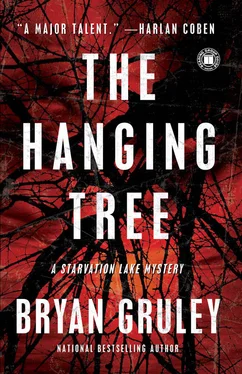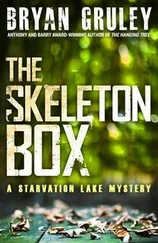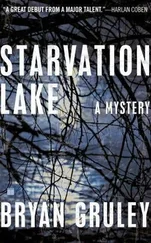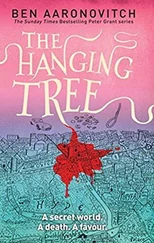Bryan Gruley - The Hanging Tree
Здесь есть возможность читать онлайн «Bryan Gruley - The Hanging Tree» весь текст электронной книги совершенно бесплатно (целиком полную версию без сокращений). В некоторых случаях можно слушать аудио, скачать через торрент в формате fb2 и присутствует краткое содержание. Жанр: Триллер, на английском языке. Описание произведения, (предисловие) а так же отзывы посетителей доступны на портале библиотеки ЛибКат.
- Название:The Hanging Tree
- Автор:
- Жанр:
- Год:неизвестен
- ISBN:нет данных
- Рейтинг книги:3 / 5. Голосов: 1
-
Избранное:Добавить в избранное
- Отзывы:
-
Ваша оценка:
- 60
- 1
- 2
- 3
- 4
- 5
The Hanging Tree: краткое содержание, описание и аннотация
Предлагаем к чтению аннотацию, описание, краткое содержание или предисловие (зависит от того, что написал сам автор книги «The Hanging Tree»). Если вы не нашли необходимую информацию о книге — напишите в комментариях, мы постараемся отыскать её.
The Hanging Tree — читать онлайн бесплатно полную книгу (весь текст) целиком
Ниже представлен текст книги, разбитый по страницам. Система сохранения места последней прочитанной страницы, позволяет с удобством читать онлайн бесплатно книгу «The Hanging Tree», без необходимости каждый раз заново искать на чём Вы остановились. Поставьте закладку, и сможете в любой момент перейти на страницу, на которой закончили чтение.
Интервал:
Закладка:
The case was Willing v. Superior Motors. It was 1991 and I was covering the auto industry for the Detroit Times.
Laird Haskell represented the estate of James P. Willing, a forty-one-year-old father of five who was killed when he ran his four-door sedan into the back of a panel truck on an interstate in southern Ohio. The lawsuit alleged that Willing’s antilock brakes had failed due to negligence on the part of the car’s manufacturer, Superior Motors.
At Haskell’s invitation, I appeared one morning at the thirty-fifth-floor offices of his firm in one of the glass-and-steel towers of the Renaissance Center on the Detroit River. A secretary led me to a conference room. Four square white boxes marked WILLING were stacked against one wall. Six yellow legal pads and three blue felt-tipped pens waited at the seat where the secretary, a woman named Joyce, deposited me. Bottles of orange juice and Coke huddled on a silver tray. “Take all the time you need,” Joyce said. “Feel free to help yourself to a beverage. Sandwiches will be brought in later.”
“If I wanted to copy some pages, is there a-”
“I’m sorry. Mr. Haskell has directed that nothing be removed from the room, including copies. You may take notes, of course.”
“OK.”
“And,” she said, pausing at the door, “you were never here.”
I grinned. “Of course not.”
I spent the next five and a half hours going through the documents in the boxes. There were depositions, internal Superior Motors memos, various court pleadings. All told, the documents showed how the engineers at Superior had detected problems in the development of the company’s new antilock brake system. They had advocated design changes that, according to certain memos, would have cost Superior a few pennies per vehicle. A “safety economist” for the company had prepared a cost analysis estimating that the potential cost of litigation over the design of the brakes would be less than what it would cost to implement the changes. The analysis calculated the cost of a single human life at $432,124.68. The design changes were never made.
I ignored the stamps on the front of many of the documents saying they had been sealed by court order. That was Haskell’s problem, I figured. I had wanted to write about the Willing case for months, but the state judge overseeing the case had, at Superior’s request and over Haskell’s objections, blocked public access to all documents obtained in discovery between the company and the Willing family. So there wasn’t much to write about.
Until Haskell’s secretary phoned me one day and asked if I’d like to spend a few hours in a conference room with some boxes of paper. I readily agreed that anything I saw or read would be off the record until Haskell gave me the go-ahead to write my story. It was better than nothing, and I couldn’t imagine that Haskell wouldn’t want me to tell the world how Superior had behaved prior to the untimely death of a father of five.
I had eaten a turkey sandwich, gone through nearly three of the boxes, and filled three legal pads with notes when Joyce came into the conference room around two thirty that afternoon and said I would have to leave because the conference room was needed. I was so excited about the prize-winning story I was already writing in my head that I never wondered why a firm with offices taking most of an entire floor in the Ren Cen didn’t have other conference rooms available.
“OK if I come back in the morning?” I said.
Joyce smiled politely. “Mr. Haskell will be in touch.”
I went back to the Times and told my editor to prepare a big display space in Sunday’s paper. We could start the story on A1 and open a page, maybe two, inside. I didn’t bother telling him that I couldn’t publish a word of it until Haskell gave me permission. I wasn’t worried in the least that he wouldn’t give it to me.
I began to worry a little when neither Joyce nor Haskell returned my calls the next day, or the day after that. Late that night, I got Haskell’s answering machine. “We plan to run this Sunday,” I said. “You’re going to love it.” Technically we weren’t supposed to tell sources when stories were running, especially stories that affected companies owned by public shareholders. But how could I get Haskell to release me to write without him knowing when? I didn’t think it could hurt.
On the Friday before the Sunday that my story was supposed to run, I received a phone call from a flack for Superior, an unctuous gnome of a man named Snell. I’d been trying to reach Haskell all morning, to no avail.
“I don’t get to say this very often,” Snell said. “But it’s a great day for American jurisprudence.”
“What are you talking about?”
“I understand you’re working on a story.”
I could almost hear his smirk.
“I’m always working on stories, Dave. What’s up?”
“I don’t think you’re going to get to write that story.”
“Which story?”
He tittered. Then an echo came over his voice as he switched to a speakerphone. “I’ve got Howie Reichs with me.”
Howie Reichs was Superior’s top safety executive.
“Hello, Howard,” I said, knowing he hated being called Howard. “To what do I owe the honor?”
“Augustus,” he said, imagining no doubt that I didn’t like being called Augustus. I actually didn’t mind. “I hate to disappoint you, but you’ll have to find another company to crucify this Sunday. “
How did he know it was Sunday? Only Haskell knew that.
“We’re going to be making an announcement shortly, and I wanted you to be the first to hear.”
I let my head drop into a hand. I knew what he was going to say.
Thirty minutes later, the company issued a two-paragraph statement: Superior had settled the Willing matter. The terms were not disclosed. The statement quoted Laird Haskell as saying the settlement “served the best interests of the Willing family while addressing the complex safety dilemmas posed by this admittedly complicated matter.”
My story never ran. The world did not find out about the design defects in the antilock brakes. But over the course of the next year, Haskell represented seven additional clients who sued Superior over the brakes. Each time, the cases were settled quickly and the terms were not disclosed. A story in the American Lawyer, quoting anonymous sources-Haskell, I guessed-estimated that the firm of Haskell, Sherman amp; Toddy had collected more than $20 million in contingency fees on the brakes cases. People kept dying, Haskell kept collecting, and my scribblings on those legal pads went unseen.
I called Haskell every day for months. Each day, Joyce would kindly tell me she’d give him my message; she may well have, but I never heard from him. I kept track of his firm’s cases, though. One morning I cornered him in a men’s room at the federal courthouse on Lafayette. He had just started to pee when I walked in and stood next to him at the adjacent urinal.
He turned and smiled at me, not the least bit surprised. “Hello, Gus,” he said. “We’re a little old for a sword fight, don’t you think?”
“I know what you did.”
“Really?” He peered into the urinal. “Then what are you doing here?”
I had come prepared. “You hear of the Miller family in Austin?”
“Austin, Texas?” He turned and faced me, shook himself off, zipped up. “No. Should I?”
“They don’t exist anymore,” I said. “They rolled their minivan when the brakes failed. Husband, wife, three little kids. All dead.”
Haskell stepped to a sink. He squeezed pink soap onto his hands, washed them in cold water, splashed water on his face. He snapped a paper towel from the dispenser and dried his hands, then patted his cheeks and forehead dry, watching himself in the mirror as he did.
Читать дальшеИнтервал:
Закладка:
Похожие книги на «The Hanging Tree»
Представляем Вашему вниманию похожие книги на «The Hanging Tree» списком для выбора. Мы отобрали схожую по названию и смыслу литературу в надежде предоставить читателям больше вариантов отыскать новые, интересные, ещё непрочитанные произведения.
Обсуждение, отзывы о книге «The Hanging Tree» и просто собственные мнения читателей. Оставьте ваши комментарии, напишите, что Вы думаете о произведении, его смысле или главных героях. Укажите что конкретно понравилось, а что нет, и почему Вы так считаете.












